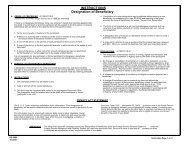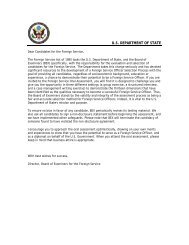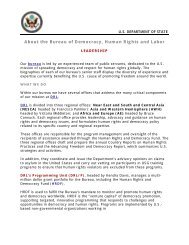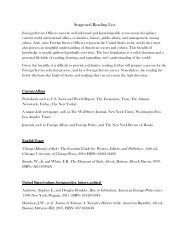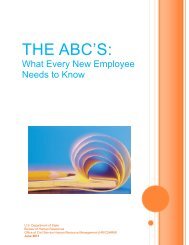Foreign Service Officer: ORAL ASSESSMENT STUDY GUIDE
Foreign Service Officer: ORAL ASSESSMENT STUDY GUIDE
Foreign Service Officer: ORAL ASSESSMENT STUDY GUIDE
Create successful ePaper yourself
Turn your PDF publications into a flip-book with our unique Google optimized e-Paper software.
To:<br />
From:<br />
Subject:<br />
Members of the Working Group on Special Projects<br />
Bob Fairclough - Labor Attache<br />
Oil Industry Safety Project<br />
I regret that I cannot be present at our discussion of potential Embassy funding for various<br />
projects; I just found out that I must accompany the Ambassador to an urgent meeting today.<br />
This memo, however, provides essential information on an important project I believe is fully<br />
worthy of our support.<br />
As you know, the Kumani Government depends heavily on oil revenues to pay for rising costs of<br />
hospitals, schools and critical infrastructure development. Thus, the Government is especially<br />
interested in making improvements to the Government-owned and -operated oil industry that will<br />
make it more productive and will increase revenue on a more reliable basis.<br />
To this end, Kumani Oil Minister Mohammad Samarrai has advised the Embassy that the<br />
Government plans to spend $120,000 to modernize an oil loading facility at the northern port of<br />
Mina’al-Bahr to make it into a fire-fighting and safety station for offshore oil operations. The<br />
American Petroleum Institute (API), representing major U.S. oil firms, has agreed to spend<br />
$55,000 to send a specialist to Kuman for four months to advise the Oil Ministry on revision of<br />
the industry’s safety codes. The Paris-based International Energy Agency (IEA) will fund (at a<br />
cost of $27,000) an expert to come to Kuman for three weeks to train a new corps of Kumani oil<br />
industry occupational and safety inspectors. The Minister has asked the Embassy to contribute<br />
$185,000: $100,000 to refurbish one fire-fighting tug boat; $50,000 for protective clothing and<br />
gear for oil workers and firefighters; and $35,000 to purchase an initial stock of fire-fighting<br />
chemicals. The total cost of the project is $387,000, including the Embassy’s contribution.<br />
This project represents a key step toward improving the safety of thousands of workers in the oil<br />
industry, an issue largely neglected by the Government to date due to budget constraints and<br />
overall mismanagement. The provision of a fire-fighting tug is especially welcome in light of<br />
last year’s rig fire, which killed 27 and seriously injured another 109 workers.<br />
Energy <strong>Officer</strong> Ernie Watts also supports this project, noting that our own oil imports from<br />
Kumani have suffered disruptions because of periodic shutdowns of production facilities due to<br />
error or accident. Much of Kuman’s oil production is exported to the U.S., so helping Kuman<br />
become a more reliable long-term supplier of oil is clearly in our interest as well as Kuman’s.<br />
Ernie also points out that this, in turn, could help stabilize volatile oil prices.<br />
Some of our colleagues see potential downsides to our participation. Citing poor food safety<br />
standards as an example, Consul General Patience Strong suggests that Kumanis’ traditional<br />
disregard for obeying or enforcing rules of any kind makes effective implementation of the<br />
project doubtful. Patience is also concerned that the tugboat we are being asked to refurbish is<br />
15 years old and that spare parts could, in coming years, become expensive and harder to find.<br />
She cautions against investing a relatively large amount of money in a piece of equipment that<br />
may have a limited useful life.



